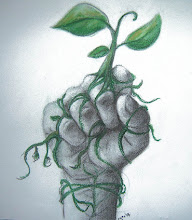----------------------------------------------------------------------------------------------
Mas devemos saber que on the other hand:
Since a meeting in Cairo in 2000, Europe's worries about human rights abuses in Africa have derailed plans to hold another summit gathering of European and African leaders.
In the intervening seven years, China has showed no such qualms. When Chinese and African leaders met in Beijing in November 2006, they agreed to deals valued at an estimated $1.9 billion.
Since then, a Chinese bank has bought 20 percent of Standard Bank, the largest African lender, for $5.4 billion, and an industrial giant from China is buying a majority stake in the largest ferrochrome producer in Zimbabwe.
Confronted by China's growing economic influence in Africa, the European Union has finally cast its reservations aside to stage a summit meeting, opening Saturday, with representatives of 53 African countries.
Despite documented evidence of human rights abuses and vote-rigging in Zimbabwe, the country's president, Robert Mugabe, has arrived in Lisbon after an EU visa ban was lifted to allow him to travel to Portugal. Omar Hassan al-Bashir, president of Sudan and the man blamed by many for the humanitarian crisis in Darfur, also is to take part.
In the intervening seven years, China has showed no such qualms. When Chinese and African leaders met in Beijing in November 2006, they agreed to deals valued at an estimated $1.9 billion.
Since then, a Chinese bank has bought 20 percent of Standard Bank, the largest African lender, for $5.4 billion, and an industrial giant from China is buying a majority stake in the largest ferrochrome producer in Zimbabwe.
Confronted by China's growing economic influence in Africa, the European Union has finally cast its reservations aside to stage a summit meeting, opening Saturday, with representatives of 53 African countries.
Despite documented evidence of human rights abuses and vote-rigging in Zimbabwe, the country's president, Robert Mugabe, has arrived in Lisbon after an EU visa ban was lifted to allow him to travel to Portugal. Omar Hassan al-Bashir, president of Sudan and the man blamed by many for the humanitarian crisis in Darfur, also is to take part.
Mugabe's presence has prompted a boycott by Prime Minister Gordon Brown of Britain, but such is the concern about the EU's role in a continent where its influence was once unchallenged that all Brown's counterparts in the EU are expected at the meeting, except the prime ministers of the Czech Republic and Slovakia.
Europe remains Africa's most important trading partner. But it is unclear how the meeting this weekend can stem the growing Chinese influence in Africa.
Up to last year, 800 Chinese companies invested $1 billion in Africa, establishing 480 joint ventures and employing 78,000 workers from China, according to the European Commission. Beijing imports 32 percent of its oil from Africa, and oil-related investment in recent years amount to $16 billion, according to commission estimates.
Joseph Bonesha, Rwanda's ambassador to the EU, said that although Europe's historical ties left it well placed to develop its ties with Africa, there was no denying China's popularity as an investment source.
"Their prices are usually more competitive than the Europeans', their contracts for construction are often subsidized, their aid is not tied to conditions, and when they offer credit, it is interest-free or at very low rates," he said as he arrived for the two-day meeting.
The Chinese have a clear and direct interest in securing supplies of commodities and opening up new markets to which they can export their goods.
"They deal as one equal to another - their interest is trade," Bonesha said. By contrast, he added, the West needed to understand that European ideas of democracy "do not necessarily correspond to democracy in Africa."
Mark Ashurst, director of the Africa Research Institute in London, said that, beyond its willingness to deal with distasteful regimes, China had one crucial advantage over Europe: a clear, unified and simple strategy toward Africa.
"Beijing is not interested in short-term preferential access," Ashurst said. "They want contracts for the long-term locking in strategic areas, mainly oil and gas, metals and other commodities."
"China has signed more than 40 free trade bilateral agreements in Africa over the last five years - that's a fantastic pace," he added.
By contrast, negotiating the EU's trade deal with South Africa in the 1990s took longer than Nelson Mandela's presidential term of office.
Even guardians of civil liberties like Reed Brody, of Human Rights Watch, say that China's role is not all bad.
"Africa needs entrepreneurs and a lot of small entrepreneurs coming in from Africa who can energize local economies," Brody said. "At the same time, mammoth government-to-government projects with no conditions or requirements attached can do a disservice to those pushing for democratic change."
The EU is negotiating new bilateral agreements with African countries that would give the former European colonies immediate duty-free and quota-free access to European markets, except for rice and sugar.
But local tariffs on EU imports would be phased out in periods of up to 25 years, though that has raised fears that African industry and agriculture could suffer. And the EU also faces criticism over the pressure it is applying to African nations to agree the partnership agreements before a World Trade Organization waiver on current preferential treatment expires on Dec. 31. Aid agencies want the EU to promise that countries that do not meet that deadline will not suffer as a consequence.
"Simpler, more harmonized European policies would be more effective," Ashurst said. "It's what everybody is trying to do, but it is not working in trade."



2 comentários:
Felizes e contentes os poucos que têm milhões continuarão a estar-se nas tintas para os milhões que têm pouco, ou nada.
Cumprimentos,
Alto Hama
Durão é o maior...
crápula politico,
ou não estivesse a ocupar o cargo que ocupa e a dizer as barbaridades que diz.
Enviar um comentário